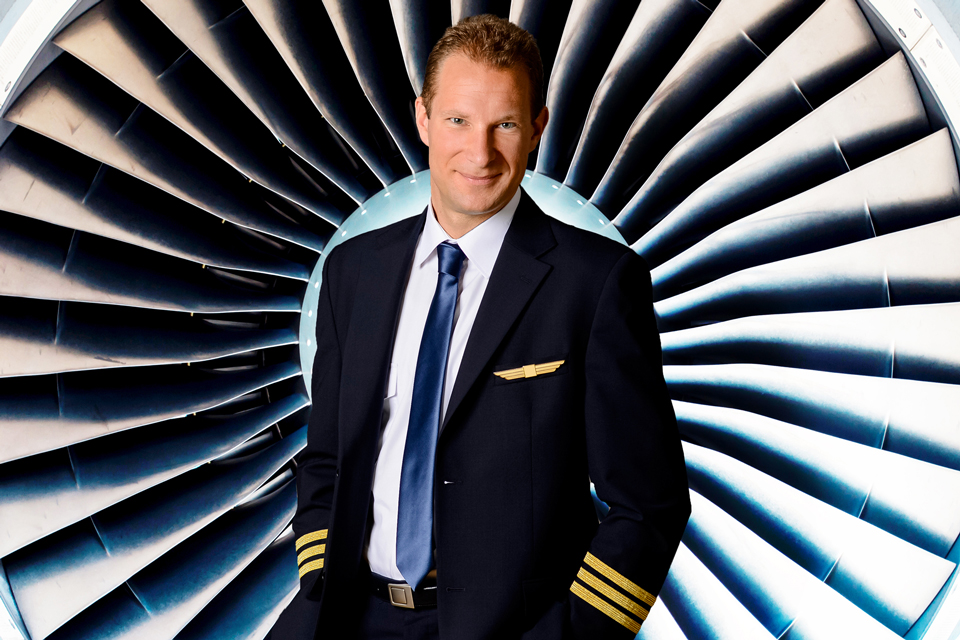What distinguishes leaders above the clouds and on the ground
TEXT & PHOTOS Philip Keil
FIND YOUR FOCUS
The job in the cockpit actually follows a very clear structure and routine patterns of action. Or so one would think. A technical defect or a difficult descent in bad weather can throw even experienced pilots out of their comfort zone. This happens more often than passengers would suspect, and no, there is no autopilot for such cases to take over and make the decision for us. Suddenly everything has changed: the enormous input from the numerous instruments, time pressure and the responsibility for hundreds of lives – there are situations in life you cannot prepare for. And neither can you pull over at 13 km altitude.
That is why there is a golden rule in the cockpit: fly the aircraft! Whatever happens up there, keep calm and fly the plane! Sounds obvious, but it is not. Sudden stress blocks our rational thinking. The trick is to avoid a loss of control by calmly directing your focus like a beam of light. On the one thing that is important. When all the warning lights and alarm bells go off again in your cockpit, the first thing to ask yourself is: what is really important at this moment? What is this really about? What is my ‘fly the aircraft’?
THE COURAGE TO BE HUMBLE
An underestimated virtue of modern leadership. Or how much humility do you see in the world today? The German term for humility ‘Demut’ comes from Old High German and means ‘courage to serve’. That brings us to the topic of leadership. Imagine looking down on the world from a bird’s eye view – that is humility. Those who lead humbly see themselves as part of the big picture. It is about relinquishing control to let others grow. That is why a good captain deliberately lets the co-pilot fly the plane during a difficult descent. Because up there, you are only as good as your team.
You too should look at things from a distance more often. Be mindful of diversity when putting together a team. And then use that feedback to reflect. Get people on board who tell you what you need to know. Not what you want to hear. There is nothing more dangerous than a co-pilot who tells the captain what he wants to hear. Even in the corporate cockpit.
ERROR CULTURE = TRUST CULTURE
When pilots find themselves in a situation they have not been in before, they have to break out of their routines. And beyond well-rehearsed routines, mistakes happen. On the ground and in the air. The reason why flying is safe today is not that pilots are flawless. The error culture has changed: the error itself is never the problem. It is the chain of errors. Neither companies nor planes crash because of an individual’s mistake. But because no one in the team sees the mistake. Or wants to see it. Or because no one dares to openly address the mistake. This requires trust in the cockpit. Because those who have no trust, try to cover up mistakes. Or keep quiet.
But even beyond the cockpit, crews need to openly discuss their mistakes in a protected pilot network in order to share the valuable experience with all colleagues. In a learning culture, it is not about ‘WHO’ made the mistake, but ‘WHY’. If we understand the ‘WHY’ behind a mistake, we can improve the aviation system in a targeted way. In practice, a positive error culture only works on a basis of trust. The entire crew behaves according to the example set by the captain.
THE INNER COMPASS
You would think that pilots always make purely rational decisions – based on numbers, facts and data. Admittedly, it would be nice to have a tailor-made checklist or calculation formula for everything in life and the problem is solved. But there is no such thing. As the manager above the clouds, I face the same challenges every day as a manager or company director. Difficult decisions go far beyond the rational. Therefore, the most important instrument for a pilot cannot be found in the cockpit. It is the ‘inner compass’. It is more than just a gut feeling. It is the power of intuition. An inner voice that feeds on all our conscious and subconscious experiences. A compass does not tell you what is right or wrong. And no, a compass does not provide a rationale either. A compass simply gives you a direction. Just as our inner voice gives us a clear signal. We all have that compass. What distinguishes a good leader is the courage to follow it. Especially when things get turbulent. May you have that courage. Have a safe journey!

Philip Keil is a pilot, successful author and keynote speaker. With his exciting keynote speeches, he inspires tens of thousands of people throughout Europe every year. In 2018, he was included in the ranks of ‘Germany’s Management Pioneers’. In 2019 and 2020 he was nominated as ‘Top Speaker of the Year’. His topics are: motivation, leadership, teamwork, change management, positive error culture. You can find out more about Philip Keil, his lectures and publications at: www.philipkeil.com

